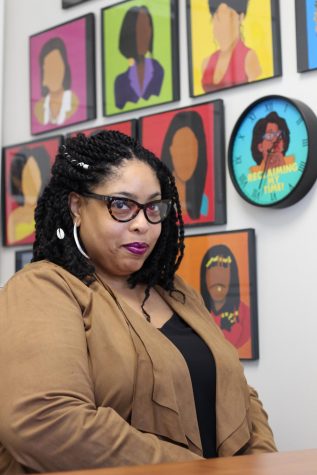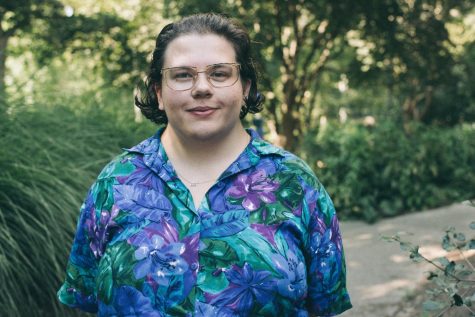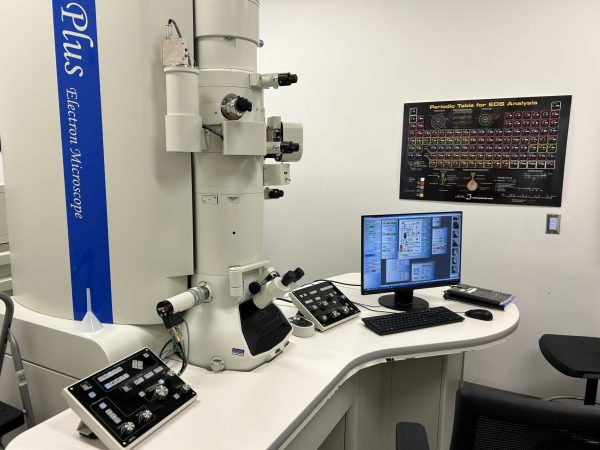Sherri Williams
Creating a New Narrative

Dr. Sherri Williams, an assistant professor of race, media and communication in the journalism division in the school of communication is a new staff member at American University. She focuses her research on race and how it relates to media consumption. Before receiving her Ph.D. at Wake Forest, she spent 10 years as a journalist. This school year, in conjunction with Melissa Harris-Perry of Wake Forest University, Williams started the project: “Black on Campus,” a writing fellowship for Black college students. The year-long project asks fellows to write to expand the narrative of college students in America. Their work will be published in The Nation. A full version of this interview can be found online.
Q: What drew you to researching the relationship between race and media?
When I was in the 8th grade, we had a current events class. Our textbook was media: we were required to read U.S. News and World Report, Time Magazine, Newsweek, our daily hometown newspaper and also watch the news. And at the time, in the mid and late 80s when I was taking that class, a lot of the stories that I saw about black people were really centered around poverty and the crack epidemic. And in my real life, I saw that there was much more to the story of black people. There was a lot involved in our areas besides drug use and crime and poverty. So I wanted to start telling those stories.
Q: How did that media consumption affect your development?
It really made me be kind of resentful toward the institution. I didn’t see where [my teacher was] bringing in other narratives too. It’s like if you see that all of the stories we’re reading about certain populations only show them standing in long lines getting free food commodities, why not look for a fuller narrative and they didn’t. And I really resented that even at that early age.
Q: You started Black on Campus with your peers at Wake Forest. Can you tell me about it?
When I finished my Ph.D., I did a post-doctoral fellowship and we did this project with Elle Magazine’s website, Elle.com, called the “Elle Scholars.” The project we produced was called Squad Care. [Harris-Perry and I] thought about doing that whole type of project again. Taking some students and working with them, refining their journalism and writing skills and giving them an opportunity to get a national byline at a high profile media outlet. I really wanted us to do something based on the students’ experiences and how we can tap into their lived experience as like a source of expertise. With everything that is going on now and has been going on across college campuses, across the country in like the past five years, I thought it would be a good idea for us to focus… on what it’s like to be a black college student on campus right now.
Q: What was your or what is your vision for the future of this program? Is it a one-year project?
Yeah, this is just really a one-year thing. You know one of the things that I think has been important for them to learn and to do is take these kind of abstract ideas and combine them with news values and actually create a new narrative. I want them to really develop some skills and really understand how important their voice can be in terms of documenting history as it’s happening because right now some of the same issues that students are dealing with in 2018 are some of the same issues that students were dealing with in 1968. But there are new manifestations of oppression and also ways in which technology is affecting white supremacy and racism in ways that we haven’t seen before.
Q: How is it or why is it important to support emerging black journalists.
Well, honestly, because they needed it. This is a difficult field, it’s really competitive and it’s just not easy for anybody. But at the same time, journalism still has a lot of whiteness. White supremacy hetero-patriarchy and misogyny embedded into it also. I mean there’s a macho culture that exists in a lot of mainstream American newsrooms and this is something that women like me have been talking about for almost 20 years. My first full-time media job was almost 20 years ago. What I’m hoping is that we and others, can start to arm people with not only the hard technical journalism skills and storytelling but also with some tools to help them navigate some of the rough terrains in newsrooms too.
Q: What are some of those tools to navigate?
One of the things that I tell students in my classes all the time is that because they are young, people have their ideas about millennials being spoiled and entitled and all that. So when you go into a newsroom there are going to be some people who will automatically discount you because you are young. And I tell students one of the ways that you can combat that… is by knowing how to put a story together, knowing how to meet deadlines, knowing how to cultivate sources and knowing how to work collaboratively across the newsroom.
Q: How do newsrooms even attempt to be more egalitarian or more diverse?
I think is important for newsrooms to make sure that they are shifting with the times. Because one thing that I have found in my own personal experience and even talking to friends and colleagues who have worked in news for a long time, is that sometimes we’ve worked in newsrooms where there may have been considerable and seismic changes everywhere except inside of the newsrooms where we worked. It’s really important for newsrooms to make sure that they are listening to the community. The news industry is really good at documenting wrongdoings of others and challenging others when it comes to oppression and ways in which people are discriminated against. But the news industry isn’t always great about doing the same work introspectively.
Q: How do we make sure that when newsrooms attempt to create a more diverse setting they are not tokenizing marginalized people?
I think what news outlets need to be doing is just bring everybody into the coverage of what they already cover anyway. Every year there are stories that news is going to always cover. What news outlets often do is go to the same well to find their sources instead of going to the suburbs and talking to some white affluent mother about gas prices or back-to-school shopping… News outlets have to stop looking at inclusive coverage as this big laborious chore because it isn’t. Because people of color are just naturally in everything. News orgs don’t have to incorporate white people into their lives just because of the structure of society. I can’t think of any ways where people of color can exist in society without actually interacting with white people. So, there shouldn’t be any way that a news outlet can continue to cover communities and only cover the same people or one group of people all the time because not only is it not fair, it’s not good business. And it’s also undemocratic.
Q: It is a theory of journalism that objectivity is a myth and true objectivity isn’t real. Does it your identity affect your reporting?
I think I bring a lived experience and a knowledge of how things operate that other people might not understand. One example [is] the Ku Klux Klan rally that I had to cover during my first full-time writing job at the AP… In our newsroom, there was a big debate about why we shouldn’t cover it because we will be giving them more credibility than they deserve just by simply showing up and recycling their story. But really, what I tried to bring to bear there was talking to a lot of different people about exactly what was happening there. I actually walked across the street and asked KKK members about some of the things they said… What I try to bring to every story is giving equal and respectful attention to everyone’s voice. The reason why I do that is because I do possess many marginalized identities that intersect to create a really distinct social experience that I have. I am this black woman who has a Ph.D., which that is obviously a category of privilege. I am this black woman who is on paper, middle class. But I also grew up in a very poor background. I am Midwestern. I am first generation college. I am fat. I am all these things that really fused together create, on paper, this really privileged person. I’m not going to discount any privilege that I do have. But at the same time, I have experiences of marginalized and oppressed people that really inform the way that I want to tell stories.

Senior studying journalism and computer science. Has been known to cry over Chicago. I'm really interested in figuring out how journalism can be used as...






